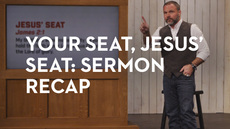My brothers, show no partiality as you hold the faith in our Lord Jesus Christ, the Lord of glory. 2 For if a man wearing a gold ring and fine clothing comes into your assembly, and a poor man in shabby clothing also comes in, 3 and if you pay attention to the one who wears the fine clothing and say, “You sit here in a good place,” while you say to the poor man, “You stand over there,” or, “Sit down at my feet,” 4 have you not then made distinctions among yourselves and become judges with evil thoughts? 5 Listen, my beloved brothers, has not God chosen those who are poor in the world to be rich in faith and heirs of the kingdom, which he has promised to those who love him? 6 But you have dishonored the poor man. Are not the rich the ones who oppress you, and the ones who drag you into court? 7 Are they not the ones who blaspheme the honorable name by which you were called?
Introduction
Imagine an idyllic church setting. Soft light showing through stained glass, cast over smiling families dressed in their Sunday best, quietly chatting with one another before the church service begins. Suddenly, a bent-over, bearded figure in filthy clothes bumps his way through the foyer doors looking for somewhere to sit down. The happy, chatty sounds die down, all eyes are on the bearded man, and the feeling in the room changes. What happens next? In reality, in most churches, this man either gets quietly interrogated as to why he’s there, or he’s discreetly ushered off to sit in a more appropriate place of the sanctuary.
We all imagine ourselves as impartial to outward appearances, but reality often reveals our biases.
In the beginning of chapter 2, the Apostle James exhorts believers to demonstrate their faith through action by not showing preferential treatment. Whenever our interactions favor others based on outward appearances (e.g., wealth or social status) rather than on the person’s spiritual position in Christ, we are at best minimizing and at worst ignoring the work of Jesus on the cross that declares believers to be fellow heirs and adopted sons of God (Rom. 8:14–17). Preferential treatment is a sin against both God and man, and the church should have no part in it.
Conversations about money and status in the church are often uncomfortable, but James discusses these issues often. James, the practical theologian that he is, urges believers to only make distinctions that God himself makes. As you study this passage, follow James’ example and let the Word honestly examine you in this area.
Observation
- Read the passage carefully. James uses a hypothetical situation to illustrate his point. Now read the passage three more times, imagining yourself in the position of the rich man, the poor man, and finally yourself in your own church as the story unfolds.
- Who is James talking to?
- How does the passage describe the rich and favored? The poor and marginalized? (v. 2, 5–7)
- What are the ways the believers in the passage have sinned? (v. 4, 6)
- What is the reason James gives for not showing partiality? (v. 1)
- What do you notice about the order of events in verse 5? Read Ephesians 1 and make note of correlations you find.
Interpretation
- Let’s now look at the passage in conjunction with other Scriptures, and allow the Bible to interpret itself.
- Read Galatians 3:26–29. When we are partial to other believers in the church, what practical effects of Christ’s work are we denying?
- Read Philippians 3:4–8. What are the earthly, sinful claims for preferential treatment Paul could have made? What was his response instead?
- Read 1 Corinthians 15:19. What is all believers’ hope in? (More on this below.)
- Read 1 John 3:14. How is a believer known?
- Read the following passages that list the sins the wealthy in particular are prone to: 1 Timothy 6:17, Jeremiah 9:23, Proverbs 22:7, Proverbs 30:8–9, Psalm 62:10, Ecclesiastes 5:13, Luke 12:19.
Application
- Self-examination is encouraged in Scripture (Ps. 4:4b). Even if you don’t show partiality, we all have room for growth in humility, faith, and obedience.
- To whom are you most prone to show partiality and why? What does this reveal about your character?
- By definition, all believers are “in Christ.” If you judge other believers as less than esteemed, are you not also judging Christ, who lives in them?
- We read in 1 Corinthians 15:19 above that our hope is in Christ alone. If you struggle with partiality, what are you putting your hope in instead of Christ alone?
- God often chose to reveal his power and glory through the poor and down-trodden in Scripture (i.e., David and Goliath, Moses and the Israelites, the disciples, etc.). Why do you think this is?
For further study
Go online to ESVBible.org and do a search on the word “poor.” Read as many verses as you can. Now, in one or two sentences, sum up God’s view of the poor and what our response as believers should be to the poor in our midst. Post these somewhere visible and meditate on them prayerfully in the coming weeks, asking what God might have you do practically to better emulate his commands regarding the poor and asking him to make his heart for the poor your own.
This devotion is adapted from the James Study Guide. Pick up a copy today for only $9.99. The Study Guide includes a 15-week curriculum, a small group study, a group inductive study, as well as 75 daily devotions for your personal or family worship.
















